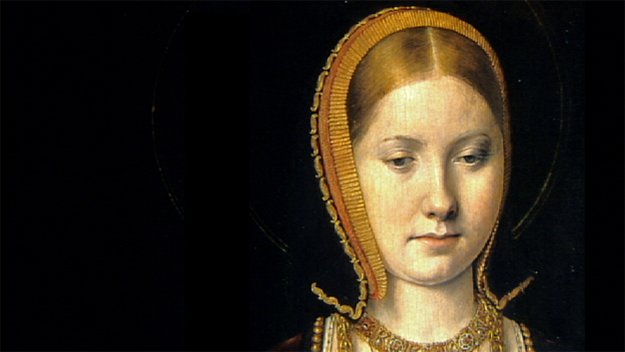I greatly admire Mantel's fictional approach to a revolutionary historical event in English history - King Henry VIII's epic feud with the Catholic church to rid himself of his wife Katherine of Aragon, a Spanish princess and aunt of the then current pope, so that he might wed Anne Boleyn - cataclysmic events seen largely from the perspective of Thomas Cromwell, chief minister to King Henry VIII from 1532 to 1540. How wonderfully she illuminates this time period in "This dynasty, this miserable rainy island at the edge of the world ..."
Mantel's brilliance, and it is brilliance, is to render historical events that may appear dry and unappealing to the modern day reader in a manner that is entirely believable and emotionally involving. It's a style that I aspire to in my own historical fiction. She does so by creating an utterly human Cromwell using simple but elegant language: a man who was beaten and abused by his father as a boy, who witnesses the public burning of a heretic, who marries happily, has and loses children to fatal illnesses, one whose head is turned by a pretty face or ankle even one belonging to a noblewoman such as Anne Boleyn's sister Mary. A man who is by turns mercenary, loyal, lustful, dutiful towards his family and dependents, pensive, melancholy, in short, immensely human. Cromwell is seen as a bit of a roughneck but shrewd, an operator of the highest order.
 |
| Katherine of Aragon, aunt of Pope Clement, hence the stickiness of the business of a divorce |
With Wolesly's death, Cromwell was elevated into Henry's inner circle of advisers. He courts Anne, has his eye on Mary Boleyn, Henry's discarded mistress, who makes advances towards him, and on Jane Seymour, a lady in waiting to Anne and (unbeknownst to all) Henry's soon to be third wife after Anne meets her unfortunate fate. After all, what are Anne's sins - tearing Queen Katherine from her throne, facilitating the lie that Henry and Katherine's was never a true marriage and therefore should be annulled, stealing her sister's lover? Hmmm, no wonder she ended up losing her head in the ensuing kerfuffle.
 |
| Anne Boleyn, the second wife |
Then he holds out his arm for someone to unstrap and restrap the royal arm guard; for someone to change his bow, and bring him a choice. A cringing slave hands a napkin, to mop his forehead, and picks it up from where the king has dropped it; and then. exasperated, one shot or two falling wide, the King of England snaps his fingers, for God to change the wind.Anne Boleyn, who is seen by Cromwell (and a good many historians it seems) as plotting to dethrone Queen Katherine of Aragon and take her place, is described as having eyes like the black beads of an abacus, which go click, click, click, tabulating what the person before her can do for her cause to be the next Queen of England.
Anne is shrewd, calculating (and much disliked) but in Mantel's hands, her ambition to be Queen, to be recognized takes on an almost noble, feminist turn at times. When she learns that she is finally pregnant, mother to the future Queen Elizabeth I, she muses: I was always desired but now I am valued. And that is a different thing, I find.
 |
| "Lucky" number 3, Jane Seymour who supplants Boleyn |
Mantel understands desire, how it is not rational, how it overcomes you. Here, Cromwell tells a protege of how King Henry speaks of Anne:
... how he shakes with desire when he thinks of Anne, how he has tried other women, tried them as an expedient to take the edge off lust, that he can think and talk and act as a reasoning man, but how he has failed with them ... A strange admission but he thinks it justifies him, he thinks it verifies the rightness of his pursuit ...
The challenges to reading this novel: there is a plethora of royals, noblemen, clerics, politicians, not to mention Thomases (Cromwell, Boleyn, Cranmore, Wriothesley, Audley, Wolesly, Avery, as well as many Marys, to cite a few) in the book but a list of the cast of characters helps orient the reader.
It would help to read up a bit on English history, just to prepare yourself as to the context. Usually, whenever Mantel refers to "he" in a scene, it is a reference to Cromwell and his point of view which lends a bit of confusion to the reading. I heard Mantel say in a radio interview that that is why she appeared to overuse the phrase "said Cromwell" in the second book Bring Up the Bodies, to avoid that confusion.
But these are minor impediments. I look forward to Bring Up the Bodies and then the third book in the trilogy that charts Cromwell's demise. I imagine it will be sufficiently gory based on this first book.
 |
| Cromwell, not pretty but very captivating ... |










1 comment:
"Mantel understands desire, how it is not rational, how it overcomes you."
Great line.
Post a Comment